How Fraudsters Are Opening Fake Business Accounts To Defraud The Public
Neusroom’s Yusuf Omotayo writes about how fraudsters are able to create fake business accounts to dupe thousands of Nigerians
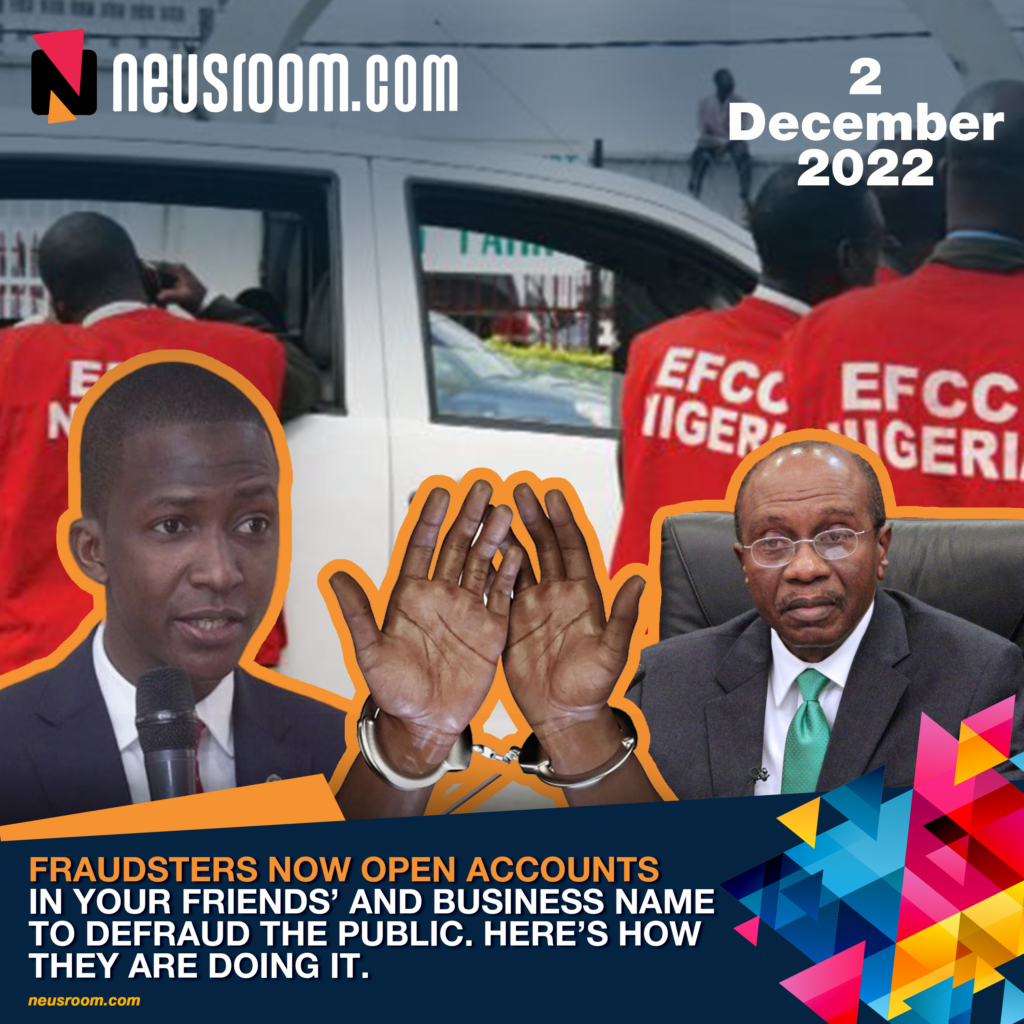
How Fraudsters Are Opening Fake Business Accounts To Defraud The Public
Written by Omotayo Yusuf for Neusroom
02 December 2022
In November 2021 Aisha Jegede, an insurance marketer in Lagos received a Whatsapp message from what she thought then was from her childhood friend asking her to send N50,000 to her Nigerian account because she wanted to complete a transaction and her Canadian bank account was delaying in processing it. Although she wasn’t familiar with the Canadian number, the display picture was truly Halima Muslim. She then sent her a PalmPay account number that bore her first and last name thereby clearing Aisha’s doubt so she made the transfer to her ‘friend’s account.’ Shortly after that, the number blocked her on Whatsapp.
“Halima is my friend so seeing a message from her to send money to her account was not strange,” Aisha Told Neusroom. “When she was in Nigeria, it was a favour we did for each other. The only thing that surprised me at first was the tone of the message because it did not contain the usual slang and jab we used to throw at each other before getting down to serious talk. Also since she went to Canada three months earlier, we had continued to chat on her old Nigerian number so when I got the message from a Canadian number with her display picture, I assumed she had finally switched to a new line. All doubts that I had cleared when the account number she shared with me bore her name.”
But Aisha would soon find out that while she was chatting with her ‘friend’, Halima in faraway Calgary in Canada was unaware that someone had created a WhatsApp profile in her name using her most-recent Instagram picture as a display image and had reached out to several of her friends and acquaintances in Nigeria. To perfect the fraud, the person had also opened a Palmpay account in her name which convinced the unsuspecting friends that they were dealing with her.
“When the number blocked me, I did not think much about it”, Aisha said. “I thought perhaps the number, being a new one, was experiencing difficulty. It was when Halima sent me a message using the old communication channel with the usual bant and lingo that I realised something was off. When I asked her if she got the money I sent to her Palmpay, she told me she did not have a Palmpay account and denied reaching out to me with another number. That was when I realised I had been duped. My own comfort was that it was not more than N50,000.”
To prevent her other friends and family from falling victim to the fraud, Halima quickly put out a message on her WhatsApp status warning her contacts not to send money to a Palmpay account purportedly from her and that she had not changed her number. That was when the messages started pouring in from people who had either sent N50,000 to the account or were on the verge of doing so.
Aisha said: “We found out that all the people that were targetted were all our former secondary schoolmates who were all members of an Old School Whatsapp group. We suspect that someone either inside the group or had access to it perpetuated the fraud. We just did not know how the person was able to open a bank account in her name”
Aisha’s story is one of several growing cases of scams that fraudsters are using to defraud unsuspecting Nigerians. They steal the identities of Nigerians usually those who just left the country and reach out to their families and friends to ask for money.
One Tope George, a Nigerian who recently moved to the UK shared her story on how using the same format, a fraudster stole her identity to create a WhatsApp profile and contacted her friends to ask for money.
She said: “They create an urgent need for it. It’s nighttime where you are so most of them who try to reach you won’t be able to.
“If your folks ask for further proof. They block them and move to the next.”
Company and Business bank account profiles targeted by fraudsters
Apart from identity theft, fraudsters have also adopted a new style of creating bank account details of businesses and companies and presenting them as valid to unsuspecting victims.
Usman Faborode told Neusroom that he posted on Facebook on one Friday in March 2022 that his wife had given birth and was calling on his mutuals to attend the naming ceremony. He said a day after, someone sent him a message via Facebook claiming to be a marketer at Cocacola Nigeria and could supply him with soft drinks and water from the company at a discounted price for the naming ceremony. The engineer was sceptical about the offer and the man’s claim to be a marketer.
Faborode told Neusroom: “He told me that the discounted offer was for only that weekend and by Monday, I would have to pay the normal cost. He sent me an OPay account detail that was designated Cocacola Nigeria. At that point, I believed him and made the payment. We even joked and I told him he was also invited to the ceremony.”
A few hours later, Faborode got another message from the ‘Coca-Cola marketer’ asking him to send N10,000 for delivery “because the truck that was coming broke down and they would have to use a third-party service.”
“Since I was already getting a discount on the drinks, I did not mind paying for the delivery”, Faborode said. “It, therefore, surprised me that after I made the payment, his number stopped going through. I called, and sent numerous text messages but got no response. That was when I suspected that I had been duped. I was too ashamed to tell anybody about it for a while until someone knew shared a similar experience with me last month (October).
How are fraudsters able to open fraudulent ‘official’ bank accounts?
Many of these fraudsters are exploiting the growing fintech space in Nigeria to perfect their scheme. In the past, opening a bank account requires visiting the banking premise and submitting supporting documents to authenticate the customer’s name, age, picture, fingerprint and address. As banks are becoming more digital, physical presence is becoming less of a requirement to open and operate an account. Some fintech companies provide the option of opening a tier 1 account which can be operated without submitting any supporting document. All that is needed is a smartphone, a phone number that can receive a One Time Password and an account number will be generated within a couple of minutes.
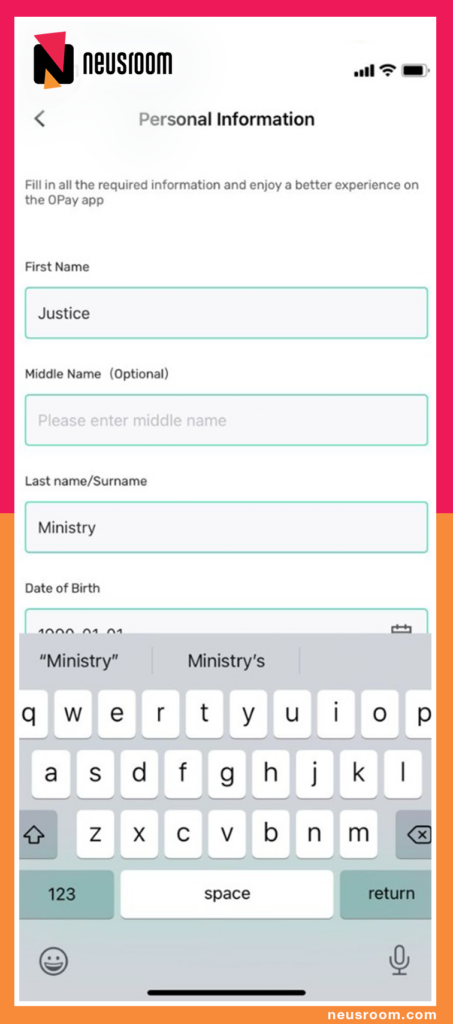
Opening an account on these fintechs only take a few minutes
These digital banks were created to allow for ease of banking and to drive financial inclusion without necessarily going into a banking hall. One can open an account, choose any name and generate a tier 1 account that can carry out a maximum of N50,000 in transactions at once and N300,000 cumulatively in a week.
Fraudsters are now taking an advantage of this ease to open an account, choose any preferred name (usually a business or company name) and under this guise defraud unsuspecting Nigerians. Victims who see this company or business name attached to an account number erroneously believe it is legitimate and pay money into these accounts. Usually, the fraudsters dispense this money quickly before they are caught by either paying for goods and services or rerouting it to another account.
The process of opening a bank account in another person’s name or in the name of a popular business or company is quite easy. A Neusroom correspondent put this to the test by opening an account in the name of the Ministry of Justice. Within a few minutes, the process was completed and the account was running to accept a maximum of N50,000. All that was provided was a phone number and a blurry photograph and an account name titled “Ministry of Justice” was opened.
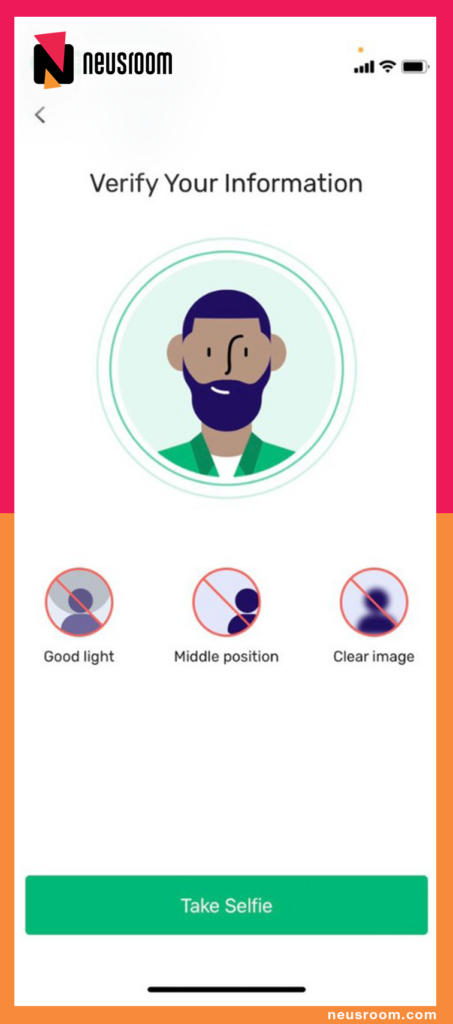
Although customers are asked to upload their pictures, a blurry picture that does not capture the face properly can still be accepted
To verify that it was up and running, the correspondent sent money to the ‘Ministry of Justice’ account and the transaction was successful, confirming that the process of opening fake accounts could be done in minutes and effortlessly
By creating an account named Ministry of Justice which could be used dubiously in the wrong person’s hands, it is evident to see how fraudsters devise the same method to create accounts in the name of DHL, FEDEX and other notable companies and businesses which they present to unsuspecting victims to defraud them.
In the same way, one can also open an account on the OPay and Palmpay platforms in another person’s name without providing supporting evidence to authenticate the name. However, this can only be operated on the tier 1 level. Most of these fraudsters keep the dubious accounts at this level as KYC is activated for higher accounts and one will be required to provide a National Identification Number and other supporting documents to move the account to a tier 3.
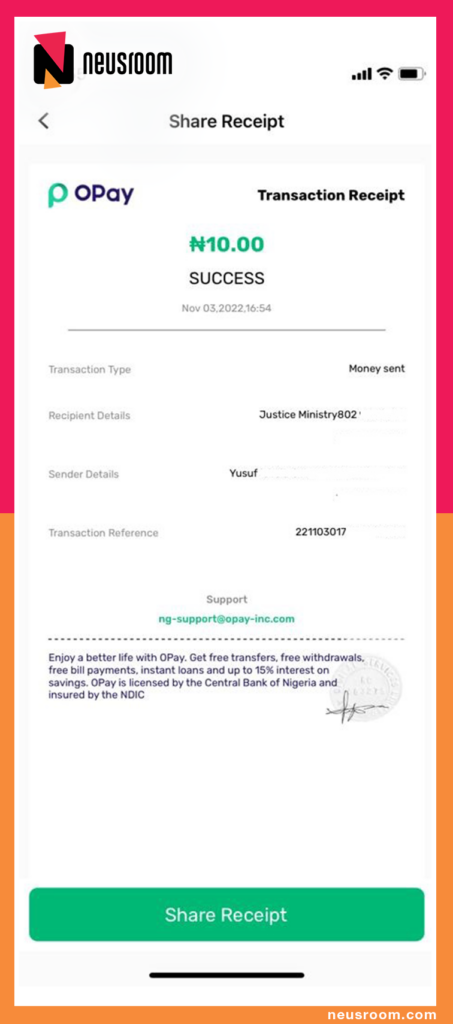
To confirm if the fake account is working, money was deposited into it and it was confirmed in a few seconds.
OPay and Palmpay are Chinese-owned fintech that entered the Nigerian market to provide digital banking platforms. OPay, owned by Opera, came into the Nigerian market in 2018 as an integrated mobile money platform offering ride-hailing service (Oride), online food order (OFood), and other services. Following the Lagos state government’s ban on motorcycle operations in some parts of Lagos, the company focused on its fintech operations providing digital banking and loan services. According to the company, it has 18 million registered users. In 2021 the company raised $400 million in funding.
Palmpay came into Nigeria’s payments market in June 2019. launching with a $40 million seed round from Chinese investors such as Chinese phone-maker Transsion via its Tecno subsidiary, NetEase and wireless communications hardware firm Mediatek. It also offers payment options and loan services and allows users to create accounts without verification at the tier 1 level. Like Opay, account numbers are the 10 digits of the users’ phone numbers minus the first 0.
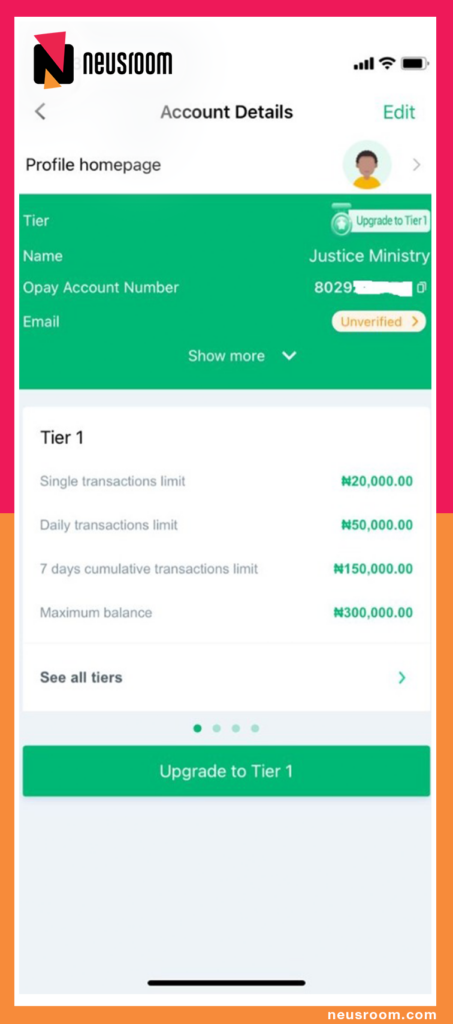
Without verification, users are allowed to select any name they like to open an account
Neusroom sent several emails to PalmPay and Opay but no response was provided at the time the story was published.
A source at OPay told Neusroom that the company had adopted a policy of not responding to journalistic enquiries.

